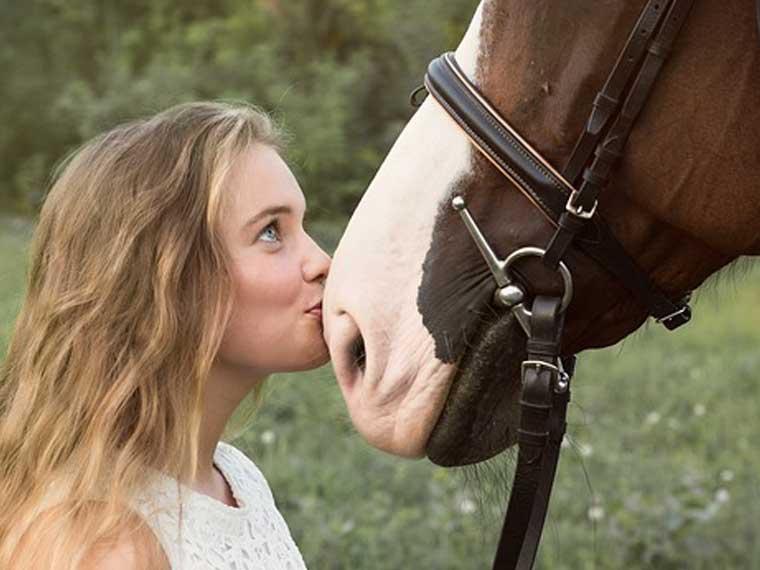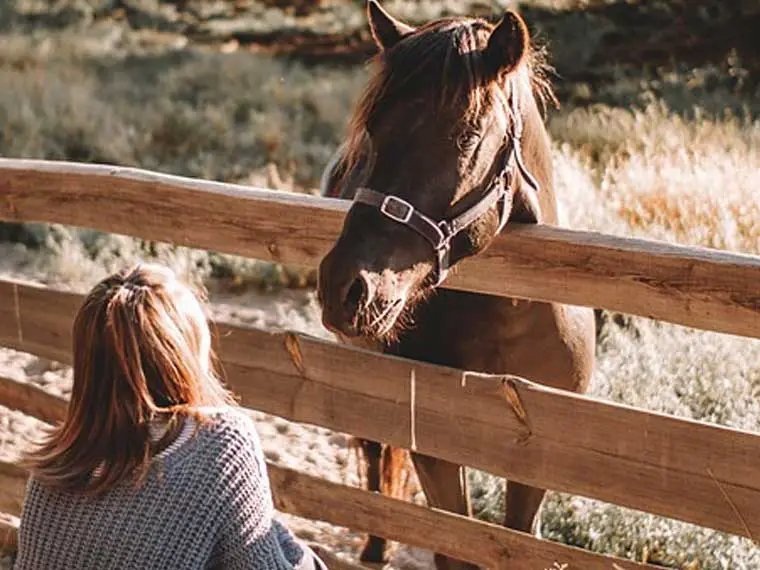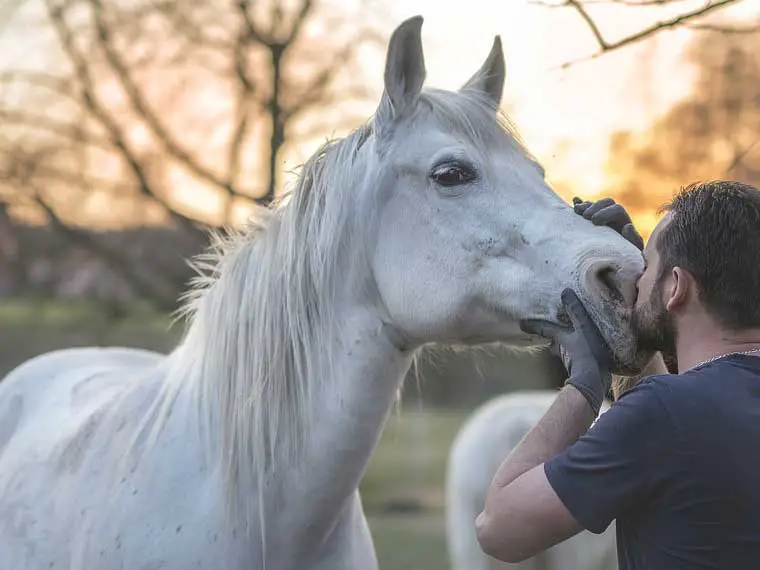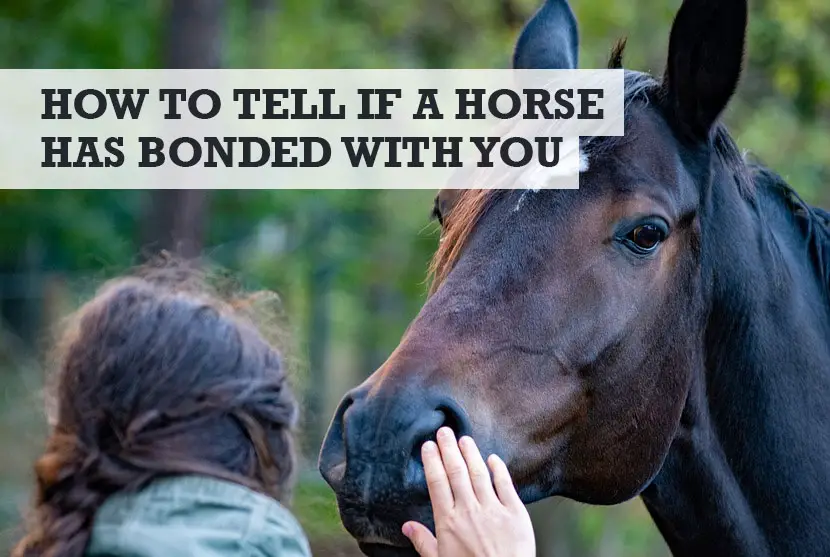Horses are emotional animals that can be very sensitive to human body language. Therefore it’s not always easy for people to tell if their horse has bonded with them or not. If you own a new horse, you might wonder when it’s has started to bond yet.
In many cases, and provided they are treated well, horses typically bond quickly with their owners, but some might take longer than others before they feel comfortable enough to do so.
Signs that your horse has bonded with you
It is essential to try and figure out how your horse feels about you because if they aren’t enjoying being around you, then there’s no point in trying to train them. Here are ten ways that will help determine whether your horse is bonding with you or not.
1. Does your horse lose it around you?
Horses bonded with their owners will often become very upset and even aggressive if the owner leaves them for a long time (this could mean pawing the ground). The horse may kick or bite or refuse to eat food if its owner is not around.
If your horse begins to act like this after you have been training them for a few weeks, there’s a good chance they have bonded with you.

2. Is the horse protective of you?
As we saw in the first point, horses that feel attached to their owners should start acting protectively towards them. They should also be more attentive and aware of what’s going on around them during the day.
Your horse should feel drawn towards you and constantly check up on you. If your horse seems protective of you but hasn’t bonded with you, they may be trying to figure out where your boundaries lie.
Handy Hint: Horses have very strong kicks which can prove fatal. Be very careful at the rear of the horse if you are not bonded yet.
3. Has the horse started to trust you?
It can take time for horses to begin trusting their owners. However, once the trust has been formed, they will likely start bonding with you. Horses are brilliant animals, and if they don’t feel comfortable around you, they probably won’t even try to build a relationship with you.
Horses that have bonded with their owners typically allow them to get on their backs without looking fearful or anxious about the idea.
4. Can the horse keep up with you?
A horse who is bonded with its owner should keep up with him when going on walks and hikes.
If he slows down or tries to avoid certain activities that might be too strenuous for him, then it means that he doesn’t trust you enough yet.
5. Do you have a routine with your horse?
Horses are creatures of habit, just like humans, so if they feel comfortable around their owners, they will enjoy having a routine. Horses love knowing what to expect from their owners so they can adjust accordingly.
It’s essential to set up some daily schedule with your horse so that both of you have an idea of what’s going on during the day.

6. Are you instilling respect in your horse?
When horses feel challenged by people around them, it can cause them stress and anxiety. Horses that have bonded with their owners will react differently. They will feel more relaxed and content around them because they know their owner respects them as a living beings.
Failing to respect your horse can often cause them to ignore you during training sessions. With this said, it’s important not to put too much pressure on your horse when training them so that the trust is never broken.
7. Do you have fun together?
Horses love having fun! If you want your horse to bond with you, you need to spend some time playing and having fun together. Go for a trail ride and let him gallop at his own pace during some of the sections of the trail.
Your goal should be to help your horse have fun and enjoy their time with you.
If your horse doesn’t want to play at all, it probably means he’s not ready to bond with you.
8. Does he react when you mention other horses?
You can tell that your horse has bonded with you if he reacts positively whenever a stranger approaches him or talks about other horses. Horses attached to their owners will feel more comfortable around them, and they won’t react as negatively when strangers approach them.
An excellent example of this would be how my mare reacts whenever someone mentions another horse- she has no response! She is completely calm and relaxed around every new person she meets, which tells us that she is very attached to me.
9. Do you ride your horse more than once a week?
Horses need to be ridden regularly to adjust and get used to being around their owners. In other words, if your horse isn’t getting any exercise from you, then he probably won’t feel comfortable around you.
That’s why it’s essential to make sure that you are riding your horse at least once a week. If your horse doesn’t enjoy having a rider on his back, then this might mean that he doesn’t trust or respect you enough yet to be able to bond properly.

10. Do you work with him regularly?
Horses need time to establish an emotional connection with their owners. When working with them regularly, they will feel challenged by your presence, which can help them feel more comfortable around you.
This will also lead to a better relationship between the two of you as time goes on and help create a long-lasting bond between human and horse.
11. Does he want to be with you?
Horses that are bonded with their owner typically want to spend as much time as possible with him. They love spending quality time with their owners, and they enjoy having them around, so if he wants to be near you all the time, then it’s a sign that he’s bonded with you.
If he doesn’t seem interested in being around you or never looks for your affection, then it probably means there is still some work left to do.
12. Do you have a strong relationship?
The stronger the bond between horse and owner, the more work your horse will put into training sessions. A horse that is not attached to its owner isn’t going to want to learn anything new because they don’t feel challenged.
On the other hand, horses bonded with their owners will show a strong interest in learning new things because they understand what you are asking of them.
13. Does your horse come to you when you arrive?
When you get to the field or stables, do you see your horse coming towards you with interest or excitement? If you do, it’s a sure-fire way of telling your horse had bonded with you.
14. Does your horse rest his head on you?
Close physical contact is important to horses that have bonded with their owners. When you’re bonded with your horse, they will lean their head onto you as a sign of trust.
Other questions relating to bonding with horses
So, there you have it- all the signs that indicate whether your horse has bonded with you! Horses can be very emotional creatures, so we need to acknowledge a problem to fix it as soon as possible.
How long does it take to bond with a horse?
It varies from horse to horse, and it depends on the training that has already taken place. Some horses will bond with you within days, while others can take several months. It’s our goal to get results as quickly as possible, so we recommend spending at least 5-10 minutes per day working with your horse to create a strong emotional connection.
Horses that have never been introduced to humans before can take up to a year before they are ready to bond with their new owners. Horses raised by their mothers and had contact with other horses from an early age, however, will usually become bonded with you in less than a month.
How do you tell a horse you love them?
For starters, it’s not something that you can say out loud. You don’t need to tell your horse that you love them for them to know how much you care about them. Actions speak louder than words, so if you show your horse how much they mean to you through quality time and affection, then he will understand.
Does kissing a horse means you are bonded with him?
No, kissing doesn’t necessarily mean that the two of you are bonded. It all depends on how comfortable your horse is around strangers and whether or not he wants to spend time with other people as well. If your horse gets nervous around everyone except for you, this could be a sign of bonding, but it necessarily means that there is a connection.
Does being bonded with your horse mean that you are friends?
The short answer to this is no, but only because the term “friends” isn’t necessarily accurate for horses. When a human interacts with another human, they are just trying to meet specific needs, whether emotional or physical.
The relationship between two humans is usually based on outside influence, while the bond between horse and owner goes deeper than this. Horses will do anything in their power to make you feel better, even if this means getting hurt them.
How do you make a horse trust you?
Building trust with your horse can either happen naturally, or it might take longer than usual if he hasn’t been exposed to many people. In most cases, building trust is a process that can take anywhere from a few days to several years.
If your horse was abused in the past or didn’t have many positive experiences with humans, this will slow down the bonding process.
The best way to gain your horse’s trust is through quality time and consistency. It’s essential for you to always be there for him so he knows exactly where he stands in your life. Horses are very emotional animals, so they must know you are on their side most of the time.
Conclusion
Take your time, be patient, be kind.
If you do that, there’s no reason why you can’t become bonded with your horse quicker than how long it might usually take.
You might also like…
- Why horses like to roll on their backs
- The truth about donkeys and horses being able to mate
- What horses like to do after dark
Image in header of a woman bonding with her horse via https://pixabay.com/photos/horse-hand-friendship-contact-5628881/


